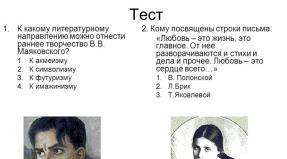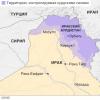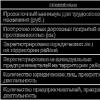The list of positions in the specialty of general medicine. Devote your life to people, or what professions are included in the medical business. Who belongs to the nursing staff
(as amended by the Orders of the Ministry of Health of the Russian Federation of 06.02.2001 N 31, of 02.04.2001 N 98, of 25.06.2002 N 209, of 14.08.2002 N 261, of 21.03.2003 N 115, of 26.05.2003 N 219, of 09.06.2003 N 241, from 20.08.2003 N 416)
1. Training of specialists in basic specialties is carried out through internship (in specialties determined by the Ministry of Health of Russia), residency, postgraduate studies.
2. Training of specialists in specialties requiring in-depth training is carried out through professional retraining, residency, postgraduate studies with a certificate in the relevant main specialty.
3. A specialist with a higher medical, pharmaceutical education has the right to train and receive a basic specialty or a specialty requiring in-depth training only if he is admitted to the relevant position.
Deputy Chief
Personnel Policy Department
M.M. PARSHIN
Appendix N 2
to the order of the Ministry
health care
Russian Federation
from 27.08.1999 N 337
SCROLL
COMPLIANCE WITH MEDICAL AND PRODUCTION SPECIALISTS WITH THE OFFICES OF SPECIALISTS
(as amended by the Order of the Ministry of Health of the Russian Federation of 05/26/2003 N 219)
I. Heads of institutions
| I. Heads of institutions | ||
| 1. | Chief physician (director, head, chief) | |
| (as amended by the Order of the Ministry of Health of the Russian Federation of 05/26/2003 N 219) | ||
| 2. | Chief Physician of the State Sanitary and Epidemiological Supervision Center - Chief State Sanitary Doctor, chief physician, (manager, director, chief) | |
| 3. | Head - pharmacist | |
| 4. | Deputy Chief Physician (Director, Head, Chief) | Health care organization and public health or clinical specialty |
| (as amended by the Order of the Ministry of Health of the Russian Federation of 05/26/2003 N 219) | ||
| 5. | Deputy Chief Physician of the State Sanitary and Epidemiological Supervision Center, Deputy Chief Physician, (head, director, head) | Social hygiene and organization of the state sanitary and epidemiological service or medical and preventive specialty |
| 6. | Deputy Head - Pharmacist | Management and Economics of Pharmacy or Pharmaceutical Specialty |
II. Heads of structural divisions of institutions (departments, divisions, laboratories, offices, etc.)
| II. Heads of structural divisions of institutions (departments, divisions, laboratories, offices, etc.) | ||
| 7. | Manager (chief) | By department profile |
| 7a. | Head of the admission department | According to the profile of any medical unit included in the structure of the institution, except for paraclinical units |
| 7b. | Head of the organizational and methodological department (cabinet) | Health care organization and public health or clinical or preventive medicine specialty |
| (as amended by the Order of the Ministry of Health of the Russian Federation of 05/26/2003 N 219) | ||
| 8. | Head of the Sanitary and Hygienic Department | According to the profile of any hygienic unit (position of a doctor who is part of the (staff) department) |
III. Doctors - specialists
Deputy Chief
Personnel Policy Department
M.M. PARSHIN
Appendix N 3
to the order of the Ministry
health care
The words "doctor" and "humanist" are not synonymous, but inextricably linked. Medical professions oblige to be humanists, to love people and help them in any, even the most unfavorable conditions. For people with health problems, it is uniquely associated with providing help, support and understanding.
A little about the profession
The profession of "medical worker" requires a certain courage and dedication from its owner. This is due to the fact that people have confidence in health workers as specialists who know their job well.
That is why, choosing medical professions as a matter of life, a person is obliged to study even after graduation, because diseases are constantly changing, as is their treatment. Among the medical educational institutions there are institutes and academies.
List of medical specialties
The list of medical professions includes such specialties as:

The listed medical professions (the list is far from complete) are the main profiles in this specialty. Each of them has narrower specialists who are responsible for the treatment of specific parts of the human body.
Specialty nurse
Secondary specialized medical education makes it possible to train specialists from the category of medical personnel. The profession of a nurse falls into this category.
A nurse (nurse) is an assistant or assistant to a doctor in a medical facility. The main task of the mid-level medical staff is to carry out the treatment prescribed by the doctor to the patient and take care of sick people.
The profession of a nurse is included in the category of nursing staff of a medical institution and has several narrower areas. Although many specialties are categorized as “medical professions,” the head nurse position is topped the list of mid-level professionals.
Head and head nurse
At the head of the nursing staff is the head nurse - this is a specialist with a higher medical education (faculty of nursing). The duties of the head nurse include organizing and supervising the work of the middle and junior medical staff, as well as improving their professionalism.
The concept of organizing the workflow includes scheduling the work of the subordinate medical staff and monitoring its implementation. Also her responsibilities include:
- Control the receipt, storage, distribution and accounting of dressings and medications, including those containing poisonous or narcotic substances.
- Supervise the performance of duties by middle and junior personnel, as well as improve their qualifications and professional level.
- Monitor the quality of disinfection of a medical institution, timely change of bed linen and monitor the transportation of patients inside the hospital.
The head nurse is the assistant to the head of the department. Her responsibilities include supervising the work of ward nurses and nursing staff.
Mid-level and junior health workers

Nurses organize the work of junior nurses: nurses, junior nurses and housewives.
Medical checkup
People exercising labor activity associated with a risk or unhealthy production, work with children and many others are required to undergo medical checkup... It can be held once a year or every two years.

There is a list that says who should get a medical check-up. The professions that it includes are categories of specialties associated with hazardous work or with an industrial risk, for example, with work at heights, harmful substances, noise, dust and others.
Also, medical examination is mandatory for food industry workers, teachers and employees of preschool educational institutions, drivers, sailors, medical personnel and representatives of other professions.
Choice of profession
Medical professions are in demand in modern society, therefore, every year, secondary specialized and higher medical institutions graduate new specialists. This is primarily due to the fact that an unhealthy environment, constant stress, unhealthy diet every year increase the number of people with pathologies or chronic diseases.
The government has prepared a new nomenclature for the specialties of medical and pharmaceutical specialists. After the approval of the regulatory legal act, the current order of the Ministry of Health of Russia dated 7.10.2015 No. 700n will be canceled. This information will be useful not only for managers medical institutions but also for those who wish
Three categories of medical specialties
The draft Order of the Ministry of Healthcare "On the nomenclature of specialties of specialists with higher medical and pharmaceutical education" provides for the allocation of three categories of specialties of specialists (prepared by the Ministry of Health of Russia on February 26, 2019):
- main specialties;
- basic specialties;
- specialties requiring specialized training.
According to this classification, to the main attributed to the specialties of higher education of the level of specialty. TO basic- specialties, obtaining the right to carry out medical or pharmaceutical activities, for which it is possible after training in residency programs. TO third category includes such specialties that require specialized training in a residency with a reduced period on the basis of one of the basic specialties.
For specialties of the third category, it is also possible to undergo training in additional professional programs of professional retraining. But only those who have work experience in certain positions and have a residency in a basic specialty will be able to undergo retraining.
New list of medical specialties
1. Medicine
2. Pediatrics
3. Medical and preventive work
4. Pharmacy
5. Dentistry
6. Medical biophysics
7. Medical biochemistry
8. Medical cybernetics
9. Nursing
Basic specialties
1. Obstetrics and gynecology
2. Allergology and immunology
3. Anesthesiology-resuscitation
4. Gastroenterology
5. Hematology
6. Genetics
7. Dermatovenereology
8. Pediatric surgery
9. Infectious diseases
10. Cardiology
11. Clinical laboratory diagnostics
12. Clinical pharmacology
13. Medical microbiology
14. Neurology
15. Neurosurgery
16. Neonatology
17. Neuropsychology
18. General practice (family medicine)
19. General hygiene
20. Oncology
21. Organization of health care and public health
22. Osteopathy
23. Otorhinolaryngology
24. Ophthalmology
25. Pathological anatomy
26. Plastic surgery
27. Pediatrics
28. Industrial pharmacy
29. Psychiatry
30. Radiology
31. Radiology
32. Cardiovascular surgery
33. Ambulance
34. General dentistry
35. Sports medicine
36. Forensic medical examination
37. Therapy
38. Thoracic surgery
39. Traumatology and orthopedics
40. Urology
41. Management and economics of pharmacy
42. Nursing management
43. Pharmaceutical chemistry and pharmacognosy
44. Physical and rehabilitation medicine
45. Phthisiology
46. Surgery
47. Maxillofacial surgery
48. Endocrinology
49. Epidemiology
For the list of medical specialties in which you can undergo professional retraining, see the memo "Specialties of the third category"
Why is the Ministry of Health changing the nomenclature of specialties
The gradation of specialties provided for by the draft order is necessary to provide medical and pharmaceutical workers a wide range educational trajectories, in which each of the specialists will have the right to change their specialty in accordance with their preferences. It will also allow them, in a short time, to obtain the right to fill the positions of medical and pharmaceutical workers, where there is a shortage of personnel.
Changes in professional standards of medical workers
If the new nomenclature of specialties is approved, then it will be necessary to amend the current professional standards. This is necessary in order to expand the requirements for education in a number of specialties.
New medical specialties in the nomenclature
The prepared draft of the new nomenclature will not cancel any specialties. They will all remain. But a new one will appear " Physical and Rehabilitation Medicine". This specialty was classified as basic.
Updating Order No. 707n and new qualification requirements for health workers
At the same time, the qualification requirements for medical and pharmaceutical workers with higher education in the direction of training "Healthcare and Medical Sciences" will be updated. Accordingly, the Order of the Ministry of Health of the Russian Federation dated October 8, 2015 No. 707n is also expected to be changed.
Such updates are necessary so that during the development of industry professional standards, there are changes in the requirements for medical workers, namely, doctors and pharmacists. Recall that since 2016, adherence to the requirements of professional standards is mandatory for some positions.
The need for change can be illustrated by the relevance of qualification requirements for specialists who completed vocational training before and after 2016. So those who received basic medical education before 2016 can undergo an internship or residency in the specialty "Dermatovenereology". But for those who received professional medical education after 2016, you need to undergo initial accreditation and residency training in the specialty "Dermatovenereology" in the part that relates to the professional competencies described in the generalized labor functions of the professional standard "Doctor-dermatovenerologist".
How can a doctor get a new specialty "Physical and Rehabilitation Medicine"
Graduates of medical universities after 2016 can master the specialty "Physical and Rehabilitation Medicine" by completing residency training.
What to do for those doctors who have certificates in the following specialties:
- "Physiotherapy and sports medicine";
- "Manual therapy";
- "Reflexology";
- "Physiotherapy".
It will be enough for them to undergo training under the professional retraining program in the direction of "Physical and Rehabilitation Medicine". So far, such a curriculum has not yet been developed in the TsOKO and will be included in the list of professional retraining courses after the approval of the above-mentioned draft order on the nomenclature of medical specialties.
New nomenclature of medical and pharmaceutical positions
The draft order also provides for changes to the order of the Ministry of Health of the Russian Federation dated 20.12.2012 No. 1183n "On the approval of the Nomenclature of positions of medical workers and pharmaceutical workers."
The new Nomenclature of positions will be supplemented with a new section “Positions of specialists with higher (medical) education who have fulfilled the federal state educational standard in the direction of training“ bachelor ”in connection with the emergence of specialists with new training in the industry."
A number of new positions of specialists with higher (non-medical) education will also be introduced in connection with the development of medical rehabilitation:
- occupational therapist,
- kinesiotherapist,
- medical psychologist.
The new nomenclature of positions will include such a position as “doctor-resident”. This position will be assigned to specialists who have completed training in higher education programs and have a certificate of primary accreditation of a specialist. During this period of time, they will be able to perform the official duties provided for by the qualification characteristics of a specialist doctor, only under the guidance of a mentor (specialist doctor) who has a specialist certificate (accreditation certificate) in the relevant specialty, answering equally with him for their actions.
At the same time, individual requirements for holding positions were taken into account, for which the Ministry of Health of Russia received a greater number of applications from employers and medical workers. For example, the possibility of holding the position of the head of a clinical laboratory of a specialist with a higher non-medical education is fixed).
Registration N 27723
In accordance with subparagraph 5.2.7. Regulations on the Ministry of Health of the Russian Federation, approved by Decree of the Government of the Russian Federation of June 19, 2012 N 608 (Collected Legislation of the Russian Federation, 2012, N 26, Art. 3526), I order:
To approve the Nomenclature of positions of medical workers and pharmaceutical workers in accordance with the appendix.
Minister V. Skvortsova
Appendix
Nomenclature of positions of medical workers and pharmaceutical workers
I. Medical professionals
1.1. Leadership positions:
chief physician (chief) medical organization;
director of a hospital (home) nursing, hospice;
deputy head (chief) of a medical organization;
head (head) of a structural unit (department, department, laboratory, office, detachment, etc.) of a medical organization - a specialist doctor;
head (chief physician, head) of a structural unit carrying out medical activities of another organization;
chief nurse (chief midwife, chief medical assistant).
1.2. Positions of specialists with higher professional (medical) education (doctors):
a) medical specialists, including:
obstetrician-gynecologist;
obstetrician-gynecologist of the workshop medical department;
allergist-immunologist;
anesthesiologist-resuscitator;
bacteriologist;
doctor-virologist;
gastroenterologist;
hematologist;
geneticist;
geriatrician;
disinfectologist;
dermatovenerologist;
pediatric cardiologist;
pediatric oncologist;
doctor-pediatric urologist-andrologist;
pediatric surgeon;
pediatric endocrinologist;
diabetologist;
dietitian;
health center doctor;
infectious disease physician;
cardiologist;
doctor of clinical laboratory diagnostics;
clinical mycologist;
clinical pharmacologist;
coloproctologist;
cosmetologist;
laboratory doctor; [<]*[>]
laboratory geneticist;
laboratory mycologist;
chiropractor;
methodologist;
neurologist;
neurosurgeon;
neonatologist;
nephrologist;
general practitioner (family doctor);
oncologist;
orthodontist;
osteopathic doctor;
otorhinolaryngologist;
ophthalmologist;
ophthalmologist-prosthetist;
pathologist;
pediatrician;
city (district) pediatrician;
district pediatrician;
plastic surgeon;
physician in aviation and space medicine;
diving medicine doctor;
hygiene doctor for children and adolescents;
food hygiene doctor;
occupational health doctor;
hygienic education doctor;
communal hygiene doctor;
physical therapy doctor;
doctor for medical and social examination;
medical prevention doctor;
medical rehabilitation doctor;
general hygiene doctor;
palliative doctor medical care;
radiation hygiene doctor;
doctor for endovascular diagnostics and treatment;
doctor for sanitary and hygienic laboratory research;
sports medicine physician;
admission doctor;
occupational pathologist;
psychiatrist;
district psychiatrist;
children's psychiatrist;
district children's psychiatrist;
adolescent psychiatrist;
adolescent district psychiatrist;
psychiatrist-narcologist;
district psychiatrist-narcologist;
psychotherapist;
pulmonologist;
radiologist;
radiation therapist;
rheumatologist;
radiologist;
reflexologist;
sexologist;
cardiovascular surgeon;
ambulance doctor;
statistician;
dentist;
pediatric dentist;
dentist-orthopedist;
dentist-therapist;
dentist-surgeon;
medical forensic expert;
forensic psychiatric expert;
audiologist-otorhinolaryngologist;
audiologist-prosthetist;
general practitioner;
adolescent therapist;
district general practitioner;
a general practitioner of a local workshop medical department;
toxicologist;
thoracic surgeon;
traumatologist-orthopedist;
transfusion doctor;
doctor of ultrasound diagnostics;
urologist;
physiotherapist;
phthisiatrician;
local phthisiatrician;
functional diagnostics doctor;
surgeon;
maxillofacial surgeon;
endocrinologist;
endoscopist;
doctor-epidemiologist;
senior physician of the station (department) of emergency medical care;
senior doctor of the station (department) of emergency medical care of mine rescue units;
ship doctor;
b) trainee doctor.
1.3. Positions of specialists with higher professional (non-medical) education:
instructor-methodologist in physiotherapy exercises;
medical psychologist;
medical physicist;
forensic expert (expert biochemist, expert geneticist, expert chemist);
expert chemist of a medical organization;
expert physicist on control over sources of ionizing and non-ionizing radiation;
embryologist;
entomologist.
1.4. Positions of specialists with secondary vocational (medical) education (nursing staff):
dental hygienist;
head of the dairy kitchen;
head of the health center - paramedic (nurse);
head of the feldsher-obstetric station - feldsher (obstetrician, nurse);
head of the medical prevention office - paramedic (nurse);
production manager of institutions (departments, divisions, laboratories) of dental prosthetics;
Dentist;
Dental Technician;
disinfectant instructor;
hygienic education instructor;
physical therapy instructor;
occupational therapy instructor;
laboratory assistant;
nurse;
nurse anesthetist;
nurse of a general practitioner (family doctor);
dietetic nurse;
nurse of medical and social assistance;
ward nurse (sentry);
nursing nurse;
dressing room nurse;
cosmetology nurse;
massage nurse;
a nurse (paramedic) for receiving ambulance calls and transferring them to mobile ambulance teams;
the nurse of the admission department;
procedure nurse;
rehabilitation nurse;
sterilization nurse;
district nurse;
physiotherapy nurse;
medical disinfector;
medical laboratory technician (laboratory assistant);
medical optometrist;
medical registrar;
medical statistician;
medical technologist;
operating room nurse;
assistant entomologist;
roentgenographer;
senior nurse (obstetrician, paramedic, operating nurse, dental technician);
paramedic;
emergency medical assistant;
medical assistant-narcologist;
paramedic driver of an ambulance.
1.5. Other positions of medical workers (junior medical personnel):
junior nursing nurse;
orderly driver;
sister-hostess.
II. Pharmaceutical workers
2.1. Leadership positions:
director (manager, chief) pharmacy organization;
deputy director (manager, head) of a pharmacy organization;
warehouse manager of a wholesale trade organization medicines;
head of the medical warehouse of the mobilization reserve;
Deputy Warehouse Manager of the Organization of Wholesale Trade of Medicines;
head (head) of a structural unit (department) of a pharmacy organization.
2.2. Positions of specialists with higher professional (pharmaceutical) education (pharmacists):
pharmacist;
pharmacist-analyst;
trainee pharmacist;
pharmacist-technologist;
senior pharmacist.
2.3. Positions of specialists with secondary vocational (pharmaceutical) education (secondary pharmaceutical personnel):
junior pharmacist;
senior pharmacist;
pharmacist.
2.4. Other positions of pharmaceutical workers (junior pharmaceutical personnel):
packer;
orderly (washer).
Notes:
1. The positions "chief doctor (head) of a medical organization", "deputy head (head) of a medical organization", "head (chief doctor, head) of a structural unit carrying out medical activities of another organization" refer to the positions of medical workers if their labor (official) duties include the implementation of medical activities;
2. The titles of the positions of the deputy head (chief) of a medical organization shall be supplemented by the name of the section of medical activity, the management of which he exercises. For example, "deputy head of a medical organization for the medical part", "deputy head of a medical organization for the medical part", "deputy head of a medical organization for clinical and expert work", "deputy head of a medical organization for working with nursing personnel" and others.
3. The positions "deputy director (head) of a pharmacy organization", "head of a warehouse of a wholesale drug trade organization", "deputy head of a warehouse of a wholesale drug trade organization", "head (head) of a structural unit (department) of a pharmacy organization" refer to the positions pharmaceutical workers if their organizational and (or) functional activity directly related to the wholesale trade of medicinal products, their storage and (or) retail trade drugs, their release, storage and manufacture.
4. The name of the doctor's position is formed taking into account the specialty for which the employee has the appropriate training and work for which is included in the scope of his duties. For example, "therapist".
5. The names of the positions of the heads (heads) of structural divisions (departments, departments, laboratories, offices, detachments, etc.) are supplemented by the name of the doctor's position corresponding to the profile of the structural unit. For example, "manager surgical department- surgeon".
6. In a medical organization that provides specialized medical care, or if there is a structural unit in a medical organization that provides specialized medical care, the name of the position "admission doctor" is supplemented by the name of the position of a doctor of the corresponding specialty. For example, "an emergency room doctor is an emergency doctor."
7. The titles of the positions "midwife", "orderly", "packer", replaced by female persons, are named accordingly: "midwife", "nurse", "packer"; and the name of the position "nurse", filled by males, is called "medical brother (nurse)".
[<]*[>] The title of the position "doctor-laboratory assistant" is retained for specialists hired for this position before October 1, 1999.
MINISTRY OF HEALTH OF THE RUSSIAN FEDERATION
ORDER
In order to improve the system of certification and certification of nursing and pharmaceutical personnel, I ORDER:
1. Put into operation:
1.1. Nomenclature of specialties of nursing and pharmaceutical personnel (Appendix 1).
1.2. The list of compliance of the specialties of nursing and pharmaceutical personnel with the positions of these specialists (Appendix 2).
1.3. Regulations on specialists with secondary medical and pharmaceutical education (Appendix 3).
1.4. Qualification characteristics of specialists with secondary medical and pharmaceutical education (Appendix 4).
2. The management of scientific and educational medical institutions, until 01.08.98, develop new and revise the existing curricula for the specialization cycles of nursing and pharmaceutical personnel in accordance with the nomenclature of specialties approved by this order.
3. To the Department of Medical Statistics and Informatics, by 01.01.98, make the necessary changes to the forms of reports of healthcare institutions in connection with the introduction of the nomenclature of specialties of nursing and pharmaceutical personnel.
4. Heads of healthcare and pharmaceutical service management bodies of the constituent entities of the Russian Federation, chief doctors of state sanitary and epidemiological surveillance centers in the constituent entities of the Russian Federation, heads of medical and pharmaceutical educational organizations of the state and municipal health care systems of the Russian Federation:
4.1. When carrying out certification and attestation of nursing and pharmaceutical personnel, be guided by the nomenclature approved by this order.
5. Appendix 1 to the Regulations on the certification of paramedical and pharmaceutical workers of the Order of the Ministry of Healthcare of Russia dated May 23, 1995 No. 131 "On approval of the Regulations on the certification of paramedical and pharmaceutical workers"; clause 5 of the order of the State Committee for Sanitary and Epidemiological Surveillance under the President of the Russian Federation dated August 31, 1992 No. 72 "On the procedure for certification of paramedical workers of the State Sanitary and Epidemiological Service of the Russian Federation" in the part concerning the list of specialties of paramedical workers, shall be declared invalid.
6. Control over the execution of this order shall be entrusted to the First Deputy Minister GG Onishchenko.
Minister T.B. Dmitrieva
ANNEX 1
APPROVED BY
NOMENCLATURE OF SPECIALTIES OF MEDICAL AND PHARMACEUTICAL STAFF
APPENDIX 2
APPROVED BY
Order of the Ministry of Health of the Russian Federation of 08.19.97 No. 249
Head of the Human Resources Department A.I. Toroptsev
Comments on the orderTamara ADUEVA, Head of the Department for Forecasting the Development of Medical Personnel of the Personnel Directorate of the Ministry of Health of the Russian Federation
Natalia OVANESYANTS, Deputy Head of the Department of Attestation and Reserve of Personnel for Work Abroad of the Personnel Directorate of the Ministry of Health of the Russian Federation
The need to develop a nomenclature of specialties for nursing and pharmaceutical workers was associated with the further improvement of certification and certification of the specified personnel. If the nomenclature of medical and pharmacist specialties has existed for more than a decade, then the nomenclature of specialties of nursing and pharmaceutical personnel, a list of their compliance with the positions of these specialists, as well as qualifications and regulations on specialists in the form in which they are presented in the order, were approved for the first time.
The nomenclature of specialties for nursing and pharmaceutical personnel includes 26 specialties. During its development, the following regulatory documents were used: state educational standards and the nomenclature of middle and pharmaceutical personnel positions.
When discussing the draft nomenclature of specialties, it was assumed that basic education allows specialists with secondary medical and pharmaceutical education to fulfill their professional duties in a number of traditionally established specialties ("general medicine", "nursing", "obstetrics", "laboratory diagnostics") immediately after graduation from a medical educational institution. In this case, the specialties indicated in the nomenclature coincide with the name of the specialties according to the diploma.
However, the nomenclature also includes specialties ("physiotherapy", "functional diagnostics", "radiology", etc.), which require additional vocational education immediately after receiving a diploma, since basic education does not provide the necessary knowledge and skills in these specialties.
The allocation of new specialties - "organization of nursing", "operations", "anesthesiology and resuscitation" - is dictated by the emergence and development of new medical technologies, improving the structure of medical institutions, increasing requirements for the training of specialists at the postgraduate level.
The approved nomenclature made it possible to streamline the certification and attestation of specialists, that is, to issue certificates and assign qualification categories in accordance with the specialties.
The developed regulations on specialists (requirements for education, rights, duties, responsibilities) and qualification characteristics (general and special knowledge, skills and manipulations) will be used in the preparation of test items for the qualification exam.
The list of the correspondence of specialties to the positions of specialists makes it possible to clearly determine in which specialty an employee holding a particular position should receive a certificate and be certified. For example, a paramedic at an ambulance station receives a certificate and is certified in the specialty "general medicine". The nurse of the ultrasound diagnostic room receives a certificate and is certified in the specialty "nursing". The medical assistant-laboratory assistant of the clinical diagnostic laboratory receives a certificate and is certified in the specialty "laboratory diagnostics".
With the introduction of new specialties, a natural question arises: will qualification categories be preserved when moving from one specialty to another? This issue is currently being considered by the ministry.
It should be noted that in addition to the main goal, this order allows you to make changes and additions to the existing regulatory documents on certification, attestation and advanced training of nursing and pharmaceutical workers.
Unfortunately, scientifically substantiated criteria for the introduction of a particular specialty have not yet been developed, which creates certain problems.
All these questions were raised at the collegium of the Ministry of Health of the Russian Federation "On the state of personnel policy and the tasks of the Ministry of Health of Russia for its improvement in accordance with the Concept for the development of healthcare and medical science in the Russian Federation", which took place on December 23, 1997.
If the readers of the journal have suggestions, additions or comments to this order, we are always ready to take them into account in order to further improve the certification and attestation system.
Maria SELEZNEVA, Director of the Moscow Educational and Methodological Center for Secondary Medical Education of the Health Committee of the Moscow Government
The success of health care reform largely depends on specialists with secondary medical and pharmaceutical education.
The key issues are the training of professionally competent specialists, as well as effective use them to meet the needs of the population - the Ministry of Health of the Russian Federation pays great attention.
In accordance with the Order of the Ministry of Health of the Russian Federation No. 261 of August 29, 1997 "On the introduction of state educational standards of secondary vocational education", the training of specialists with secondary medical education is carried out according to curricula that implement state educational standards in terms of state requirements for the minimum content and level of training of graduates in all specialties of the industry, in accordance with which considerable attention is paid to the issues of psychology, economics, management in the learning process. The terms of primary training (on the basis of complete general secondary education) have been increased to 3 years.
The "Regulations on Specialists" for each specialty approved:
- general provisions;
- duties;
- rights;
- a responsibility.
The section "qualification characteristics" approved the requirements for:
- general knowledge;
- general skills;
- special knowledge;
- special skills;
- the ability to perform manipulations according to the approved list.
Order No. 249 of the Ministry of Health of the Russian Federation "On the Nomenclature of Specialties of Nursing and Pharmaceutical Personnel":
- equalizes the requirements for both graduates of educational institutions and for working specialists;
- determines the need for universal continuing education and advanced training, not only in order to prepare for certification and certification exam, but also puts specialists in front of the need to improve the level professional competence, competitiveness in a rapidly changing world, adaptation to modern requirements, compensation for missing knowledge.
Further training is necessary not only for working specialists with secondary medical education, but also for teachers of educational institutions.
In order to implement Order No. 249, the priority tasks are:
1) in the system of primary training - correction of curricula, preparation of materials for the final state certification of graduates in accordance with the requirements of Order No. 249 of the Ministry of Healthcare of the Russian Federation;
2) in the system postgraduate education- revision of training programs for advanced training of specialists with secondary medical education;
3) organization of the study, implementation of Order No. 249 in medical institutions, associations of specialists;
4) revision of attestation and certification materials by the relevant commissions.
The implementation of Order No. 249 of the Ministry of Health of the Russian Federation "On the Nomenclature of Specialties for Middle and Pharmaceutical Personnel" is a new step towards improving the training and professional competence of working specialists.



















